Beppe Mokuza is a Zen monk in the Sōtō Zen Buddhist tradition, part of the unbroken Dharma lineage that traces back to Shakyamuni Buddha. A direct disciple of Master Roland Yuno Rech—who conferred Dharma transmission upon him in 2019—he is dedicated to transmitting Zen in the spirit of Master Taisen Deshimaru Roshi, faithfully following the Sōtō School tradition.
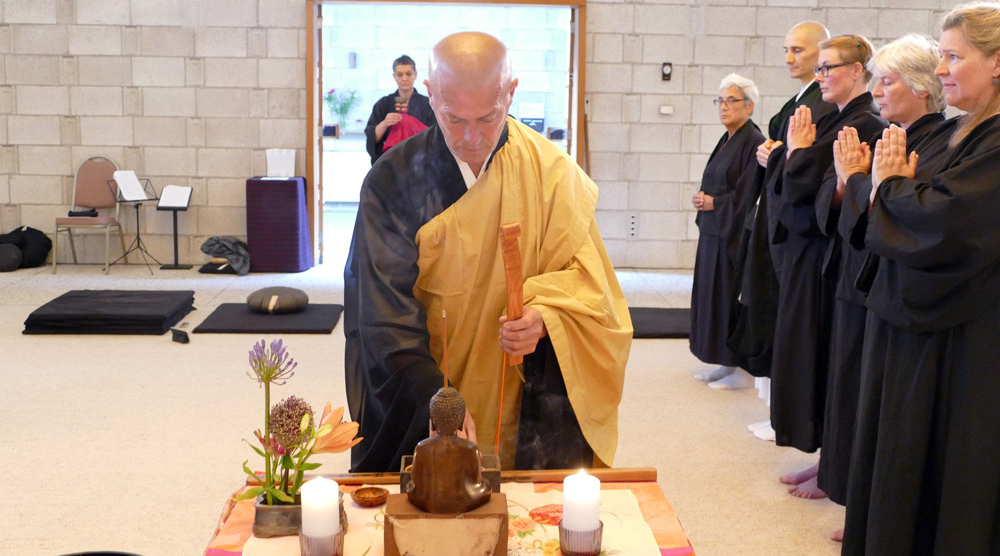
Zen Master Beppe Mokuza Signoritti
He received his training at the Mokusho Zen Dojo in Turin, under the guidance of monk Ezio Tenryu Zanin, where he deepened his zazen practice and studied the traditional art of Sumi-e painting. In 2009, he moved to Alba, in the Piedmont region, where he founded the Bodai Dojo—a stable center for Zen practice and training.
A man who has lived fully and a Zen Master profoundly rooted in direct experience, he has been dedicated to spreading Zen throughout Italy and Europe for over thirty years. A deep lover of nature, he has always cultivated a spiritual path grounded in simplicity and concrete daily life.
For many years, he served as Tenzo (head cook) during intensive retreats at the La Gendronnière Zen Temple in France, refining a form of cooking infused with mindfulness and a spirit of service in every action.
He is the founder and spiritual guide of the Doji Zen Group in the Netherlands, based in Haarlem, where he travels several times a year to lead sesshin and workshops. His teachings have found a strong and growing following in the Netherlands.
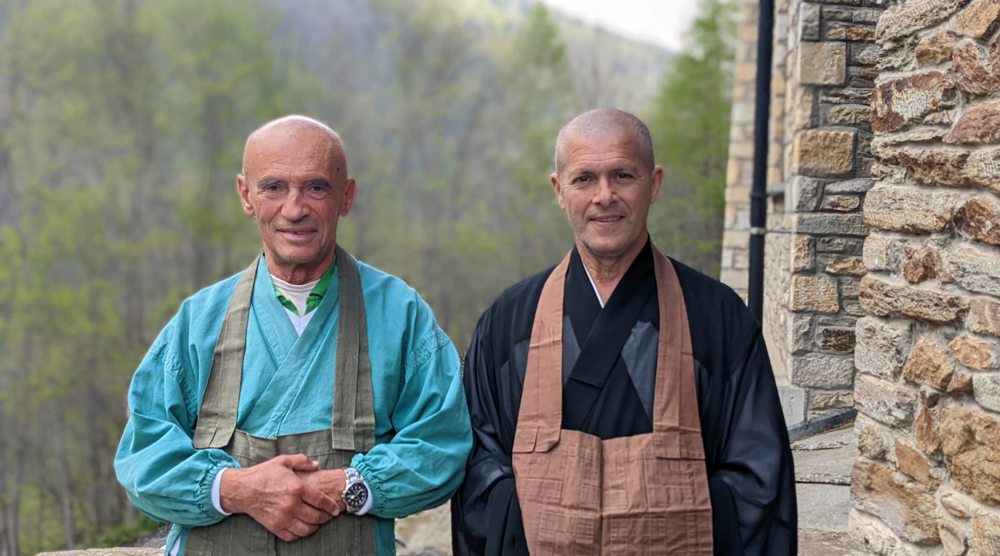
Master Roland Yuno Rech with Zen Master Beppe Mokuza Signoritti
He is also the founder of the École Internationale de Sumi-e, based in Versailles, France. For many years, he has organized courses, conferences, and workshops across Europe—including in France, Germany, the Netherlands, Belgium, and Switzerland—promoting an approach that integrates art, meditation, and the spiritual path.
In 2019, after a long search, he identified the hills of the Langhe as the ideal setting for establishing a Zen temple immersed in nature. In 2024, during a new journey to Japan, he was officially recognized as a certified Master within the Sōtō Zen lineage, and began the construction of the Gyogenji Temple.
Today, he is fully dedicated to the development of the Temple and to the training of both novice and experienced practitioners, transmitting a living Zen that weaves together awareness, art, community life, and care for people and the Earth.
The Zen Bodai Dōjō Association was founded in 2008 in Alba (province of Cuneo, Piedmont) by Master Beppe Mokuza. Together with two other monks, he chose to settle in this city and establish a Zen practice center, following the growing interest in zazen meditation.
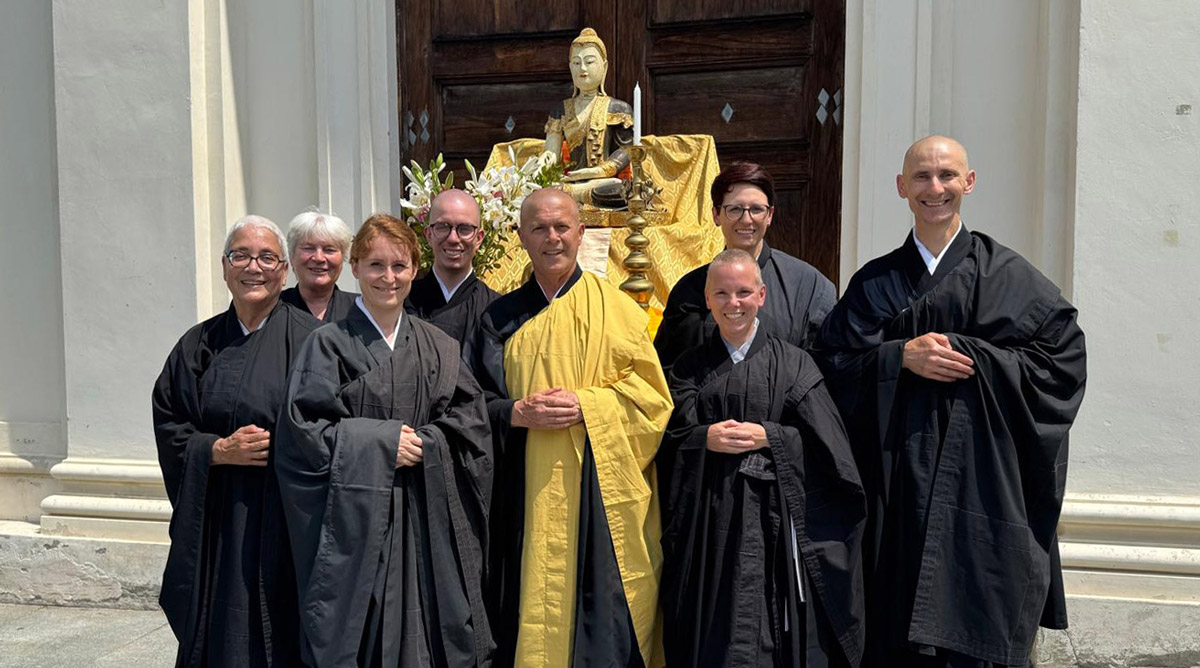
The Zen Bodai Dōjō Association
From the very beginning, the Bodai Dōjō (“The Dōjō of Awakening”) has been a place of intense dedication. The Master and his ever-growing group of disciples have worked tirelessly to spread the Dharma, practicing daily meditation and organizing training events not only in Alba but also throughout Italy and Europe.
The Association also takes part in a wide range of events (fairs, conferences, conventions) with the goal of sharing the Zen message in its many forms.
Since 2021, the Zen Bodai Dōjō Association has been an active member of the Italian Buddhist Union (UBI). The Association is also morally affiliated with the International Zen Association (AZI) founded by Taisen Deshimaru and the ABZE (Association of Zen Buddhists of Europe), which brings together the disciples of Master Roland Yuno Rech (senior teacher of Beppe Mokuza).
The monks of Bodai Dōjō regularly travel to Japan for extended training periods. Both the Association and the Temple in Costigliole d’Asti are formally recognized within the Sōtō-shū, the international community that preserves and transmits the teachings of the Sōtō Zen tradition based in Japan.
Beppe Mokuza is surrounded by an international group of practitioners—mostly monks who have received ordination in the Sōtō lineage, as well as bodhisattvas (lay practitioners who have taken refuge in the Sangha, the community). They include Italians, several Germans, and, above all, French and Dutch practitioners. For many years, they have been devoted to Zen practice and now actively participate in the creation of a place where the Buddha’s teaching can be lived, shared, expressed, and transmitted.
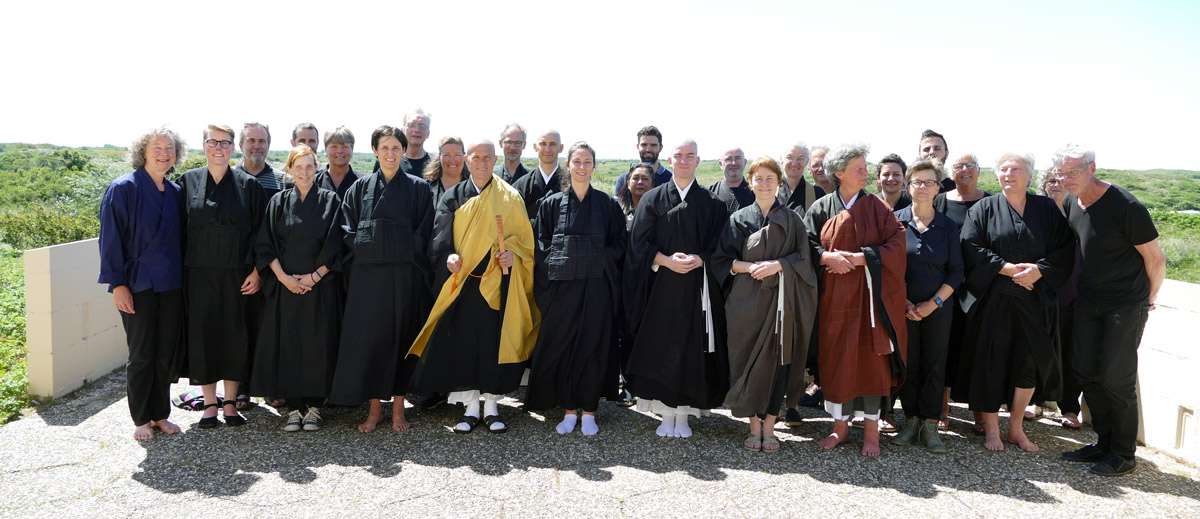
An international community
At Gyogenji Temple, the practice follows the Sōtō School of Zen (Sōtō-shū), rooted in the teachings of Eihei Dōgen and Keizan Jōkin, founders of this tradition in Japan. The transmission of the Dharma has been handed down directly and uninterruptedly through the centuries, keeping alive the essential practice of zazen and the original spirit of the Way.
A charismatic and unconventional figure, Kōdō Sawaki was known as “Homeless Kōdō” due to his ceaseless travels from temples to villages and cities, bringing the Zen teaching wherever he went. With his direct and rigorous yet accessible style, he helped revive the practice of zazen among laypeople, breaking down the strict divide between monks and ordinary practitioners. His entire life was devoted to transmitting one essential teaching: to sit in silence, in the correct posture, and directly realize the Way.
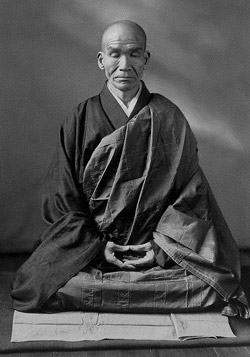
Kōdō Sawaki
A disciple of Kōdō Sawaki, Taisen Deshimaru carried on his master’s legacy and brought it to Europe, where in 1967 he began spreading the practice of Zen in an accessible yet rigorous way. Founder of the International Zen Association (AZI) and numerous dōjō, he introduced thousands of people to zazen and laid the foundation for the development of a solid European Zen community. His mission was officially recognized by the highest authorities of the Sōtō School in Japan, who confirmed the legitimacy of the transmission he initiated.
77th Abbot of Eihei-ji Monastery—one of the two spiritual hearts of the Sōtō Zen School in Japan—Niwa Zenji was a central figure in both the preservation and renewal of the tradition. He dedicated his life to maintaining the authenticity of zazen practice and supporting the spread of Zen beyond Japan. After the passing of Taisen Deshimaru, he formally acknowledged the Dharma transmission (shiho) of several of Deshimaru’s disciples, including Roland Yuno Rech, thus ensuring the connection between the ancient Japanese monastic tradition and the emerging European communities.
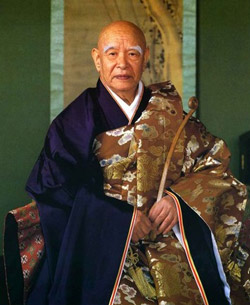
Niwa Zenji
A direct disciple of Taisen Deshimaru, Roland Yuno Rech received shiho (Dharma transmission) from Niwa Zenji in 1984, continuing the official Sōtō lineage in Europe. Having followed Deshimaru since the 1970s, Rech played a key role in organizing and spreading Zen practice both in France and across other European countries. Author of numerous writings, he is today recognized as one of the leading European Zen teachers, respected for his deep experience and his ability to transmit the practice in a way that is direct, simple, and profound.
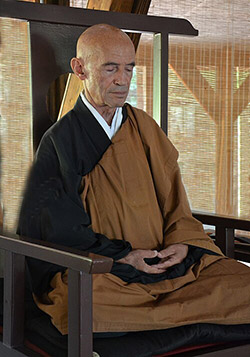
Roland Rech
Beppe Mokuza received Dharma transmission from Roland Yūnō Rech in 2019.